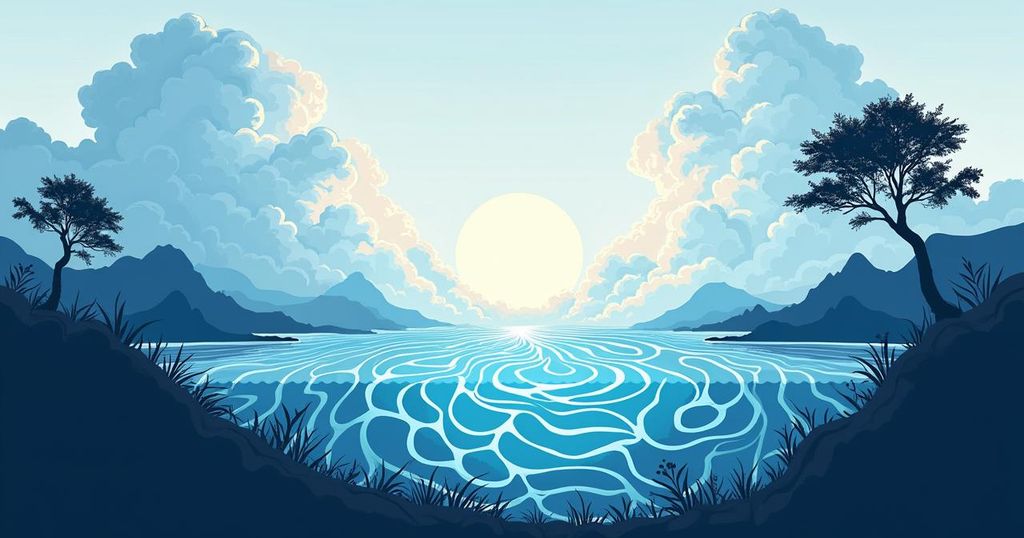The United Nations warns that climate change is causing the water cycle to become increasingly erratic, leading to more intense floods and droughts around the world. Last year saw the driest river conditions in over 30 years and significant glacier melt. Approximately 3.6 billion people currently lack sufficient access to freshwater, a number projected to grow. The UN calls for improved monitoring of freshwater resources and urgent global action to address the challenges posed by these environmental changes.
The United Nations has issued a grave warning regarding the increasing unpredictability of the planet’s water cycle, highlighting that intensified floods and droughts serve as distress signals of impending challenges due to climate change. According to the UN’s World Meteorological Organization (WMO), last year marked a significant downturn in global river conditions, with the driest rivers recorded in over three decades, alongside the most substantial glacier ice loss observed in half a century and numerous flooding incidents. The WMO Secretary-General, Dr. Celeste Saulo, emphasized that “Water is the canary in the coalmine of climate change.” She elaborated that the extreme occurrences of rainfall, floods, and droughts are increasingly detrimental to human lives, ecosystems, and global economies. The underlying cause, advocated by Dr. Saulo, lies in the heightened temperatures of the Earth’s atmosphere which have rendered the water cycle erratic and unpredictable. The prior year was documented as the hottest on record, witnessing persistent droughts due to elevated temperatures alongside extreme global flooding. Weather phenomena such as La Nina and El Nino have additionally played a role; nevertheless, human-driven climate change remains a significant influencing factor. As Dr. Saulo articulated, “A warmer atmosphere holds more moisture, which is conducive to heavy rainfall. More rapid evaporation and drying of soils worsen drought conditions.” The repercussions of these water cycle changes have disproportionately impacted several regions, particularly Africa, which has seen an alarming rise in casualties from natural disasters. A catastrophic flood in Libya resulted in the collapse of two dams, claiming over 11,000 lives while severely affecting the local populace. Currently, approximately 3.6 billion individuals lack regular access to fresh water, with forecasts predicting this number may exceed five billion by 2050. In the last three years, over half of river catchments globally have been drier than usual, and the inflows to reservoirs have consistently fallen short of normal levels. Moreover, glaciers are melting at unprecedented rates, leading to the loss of over 600 billion tonnes of water, marking the worst rate in the past fifty years. Dr. Saulo warned that the melting of glaciers poses a significant threat to long-term water security, yet immediate action is lacking. The WMO urges better monitoring of freshwater resources and the establishment of early warning systems to mitigate damage to affected populations. Dr. Saulo stated, “We cannot manage what we do not measure.” Moreover, Dr. Stefan Uhlenbrook, director of the WMO’s hydrology, water, and cryosphere department, underscored the critical need for investments in infrastructure to secure water resources and safeguard individuals from environmental hazards. He cautioned that returning to a more stable natural water cycle is a daunting challenge. As Dr. Uhlenbrook articulated, “The only thing we can do is to stabilize the climate, which is a generational challenge.”
The ongoing crisis surrounding water resources is intrinsically linked to climate change, which has altered many of the planet’s fundamental systems, including the water cycle. The UN’s World Meteorological Organization has increasingly focused on how these changes influence both the availability of freshwater and the frequency of extreme weather events like droughts and floods. The increasing intensity of these events correlates with rising global temperatures, further complicating water management and security issues worldwide. The current landscape indicates a pressing need for global cooperation in addressing these challenges and implementing solutions to safeguard water resources against climate change.
The findings presented by the UN underscore the urgent need for immediate and coordinated global action in response to the alarming changes in the water cycle driven by climate change. With millions at risk due to droughts and floods, it is vital to enhance our monitoring systems, rethink water management practices, and invest in sustainable infrastructure. As the climate continues to stabilize, the preservation of both human lives and ecological systems will depend on effective stewardship of water resources.
Original Source: www.france24.com






